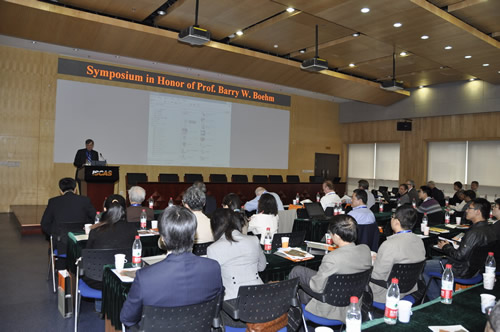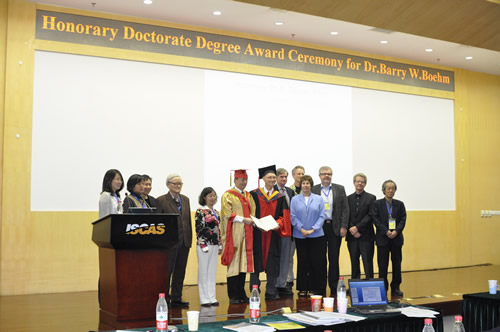The Successful Conclusion of Symposium in Honor of Prof. Barry W. Boehm
Date:2011-05-10
The Symposium in Honor of Prof. Barry W. Boehm was hosted by Institute of Software, Chinese Academy of Sciences (ISCAS) and International Journal of Software and Informatics (IJSI) together. Dozens of top experts and scholars in the software engineering field from seven countries attended the meeting. To commend the outstanding contributions of Prof. Barry W. Boehm, who is regarded as the pioneer of the software engineering field, the Conference Organizing Committee and over 100 participants celebrated his 75th birthday during the conference.
Prof. Barry W. Boehm is the founder and former director of USC Center for Systems and Software Engineering. He is a member of the National Academy of Engineering, an ACM Fellow, and an IEEE Fellow. From 1989 to 1992 he served within the U.S. Department of Defense (DoD) as Director of the DARPA Information Science and Technology Office, and as Director of the DDR&E Software and Computer Technology Office. His contributions to the field include the Constructive Cost Model (COCOMO), the Spiral Model of the software process, the Theory W (win-win) approach to software management and requirements determination and two advanced software engineering environments: the TRW Software Productivity System and Quantum Leap Environment. Prof. Boehm has also been the author of hundreds of papers, the supervisor of dozens of Ph.D. students.
The invited foreign academic experts including: Prof. Leon J. Osterweil and Prof. Lori Clarke (Department of Computer Science, University of Massachusetts), Prof. Ross Jeffery (Emeritus School of Computer Science and Engineering, University of New South Wales, Australia), Prof. Dieter Rombach (University of Kaiserslautern & Fraunhofer IESE, Germany), Prof. Dines Bjorner (Technical University of Denmark), Prof. Shanghua Teng (Director of Computer Science Department, University of Southern California). The invited foreign experts form software engineering industry including: Mr. Walker Royce (Chief Software Economist, IBM), Kouichi Kishida (Technical Director, SRA, inc., Japan), Mr. Neil G. Siegel (Chief Engineer, Northrop Grumman Corporation, USA), Dr. Narayana N. R. Murthy (Founder and Chairman, Infosys, Inc., India) and Mr. Subrahmanyam Goparaju (Senior Vice President, Infosys, Inc., India). Presenters of four peer-reviewed papers and over 100 audience from ISCAS, Nanjing Univ., Wuhan University, and Chinese software industry also attended this event.
The workshop began in the morning of 26 April, 2011 with opening remarks from the General Chair, Prof. Leon J. Osterweil. Then Prof. Mingshu Li (the Director of ISCAS) and Prof. Ruqian Lu (Editor in Chief of IJSI), gave the welcome speech respectively. After that, the invited experts all gave excellent speeches about the numerous and fundamental contributions to the theory and practice of software engineering made by Prof. Barry Boehm including the research topics and results they were interested in and were inspired from. The presentations led to some enthusiastic discussions. In the last session of the workshop, Prof. Mingshu Li read the decision of the Academic Degrees Committee of the State Council and awarded an Honorary Degree to Prof. Barry W. Boehm.
There were numerous friends and students of Prof. Boehm sent their videos to express the congratulations, which showed some interesting things about Prof. Boehm and brought much fun and festival atmosphere to the meeting.
The symposium ended by a speech given by Prof. Boehm. All the participators congratulated Prof. Boehm for his excellent achievement and splendid contributions, and took photographs with him for memory.
This symposium attracted many researchers, teachers and students to attend, who filled the meeting place up. The teachers and students exchanged their thinking with the experts who made presentation about the recent research in the range of software engineering. This symposium provided a precious opportunity for our teachers, students to exchange ideas with top scholars of the world, deepened the collaborative relationship between ISCAS and USC. This international symposium also offered a platform to the researchers that interest in the domain of the software and systems engineering. Furthermore, it made a positive effect in strengthening the international exchanges, getting comprehensive and timely knowledge of this field, improving the force of ISCAS in the field of the software and system engineering. Most importantly, it contributed remarkably to promote the development of software and systems engineering in China.


